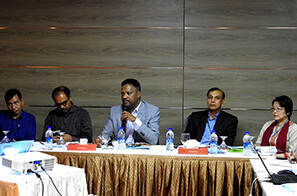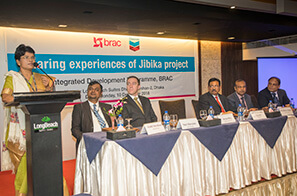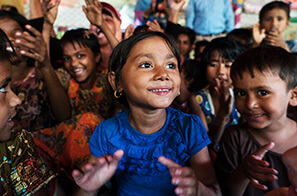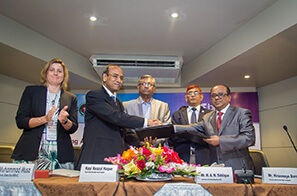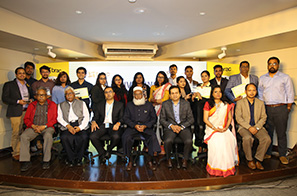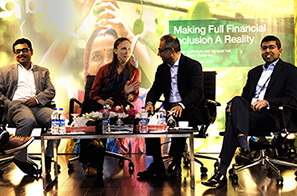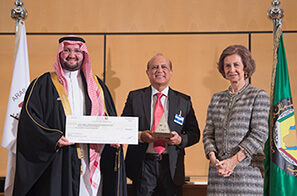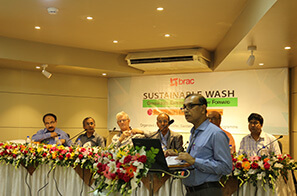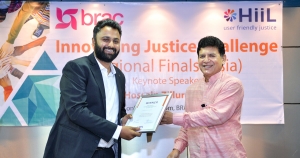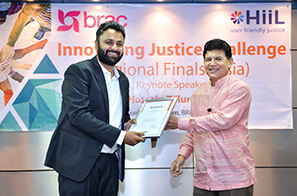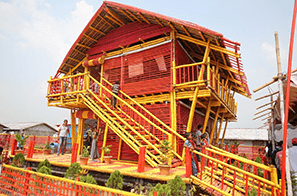
BRAC
Election pledge for disease eradication demanded at roundtable
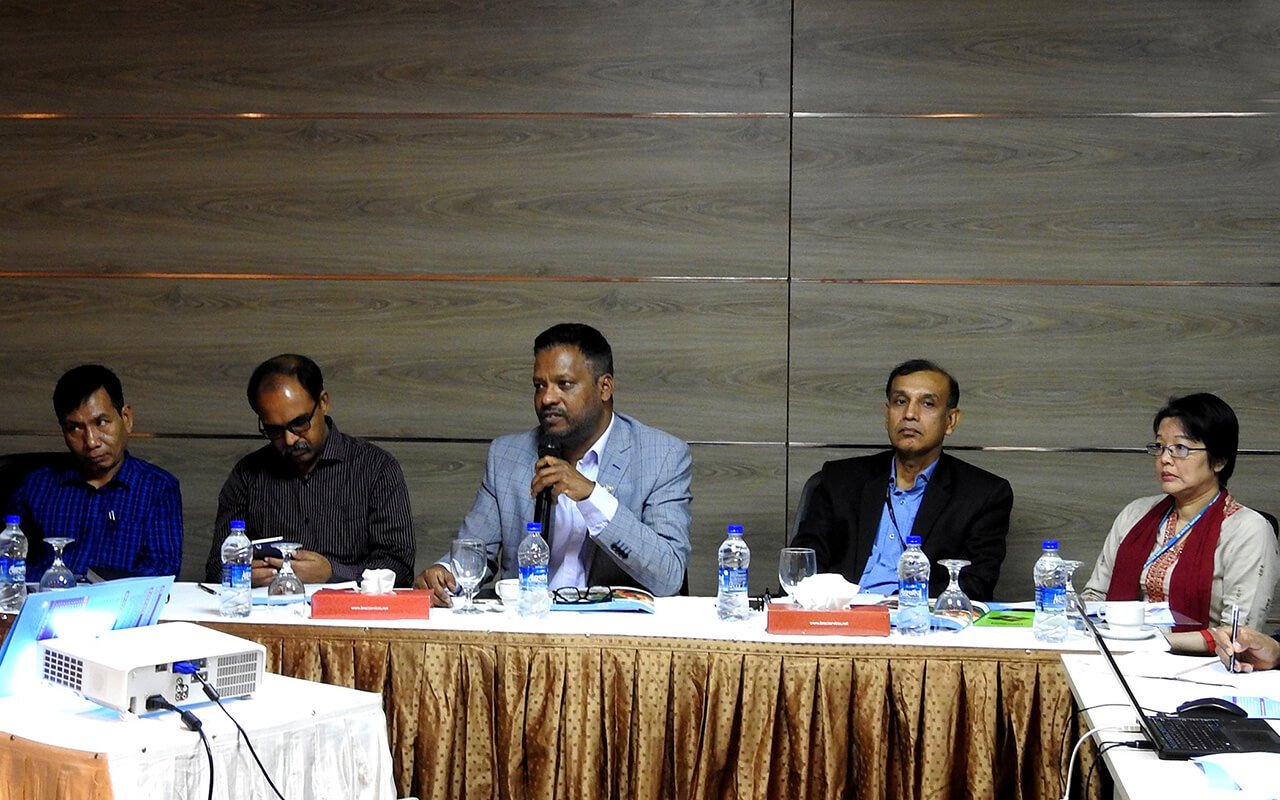
The world will need to halve the deaths from tuberculosis and reduce newly infected patients by 80 per cent to meet Sustainable Development Goals by 2030. This will essentially need stepping up effort in both TB diagnosis and prevention. The implication of the disease is so broad and deep in the country's public health that political parties should bring it into their manifestoes for the forthcoming parliamentary elections.
Speakers expressed these views today on Monday (10 December 2018) at a roundtable workshop organised at the BRAC Centre in the capital. National Tuberculosis Control Programme, Bangladesh Health Reporters Forum and BRAC jointly organised the event titled 'Ensuring TB diagnosis and prevention through proactive role'.
National TB Control Programme line director Professor Dr Md Shamiul lslam was present at the event as the chief guest. Advisor to NTP Bangladesh on Global Fund and MDR-TB Dr Md Abdul Hamid Salim presented the keynote paper, while BRAC associate director for communicable diseases programme Dr Mahfuza Rifat gave the welcome speech.
Moderated by Bangladesh Health Reporters Forum (BHRF) vice president Nurul Islam Hasib, the programme was also addressed, among others, by WHO Bangladesh medical officer for communicable diseases surveillance Dr Mya Sapal Ngon, BRAC director for communicable diseases and WASH programme Dr Md Akramul Islam, Damien Foundation country director Dr Aung Kya Jai Maug, and BHRF president Toufiq Maruf.
Professor Dr Md Shamiul lslam said, the main objective of the National TB Control Programme is to increase TB diagnosis, for which it is now focusing on applying different modern techniques.
He further observed that any decrease in donor assistance may negatively impact the country's fight against tuberculosis. But the government on its own is putting high emphasis on its control as Bangladesh is still one of the high-risk nations in TB. 'I hope that the Global Fund and other donors will continue their assistance,' he added.
Dr Md Akramul Islam, while saying the world will need to halve the deaths from TB by 2030 to meet the related SDG targets, viewed that the political parties should include this issue in their pledge for the national elections due end of this year.
He stressed strengthened work at the community level, including dissemination of TB prevention awareness messages, increase in salary and other facilities for healthcare professionals, deploying adequate number of skilled medical technicians, and ensuring treatment for all irrespective of financial condition.
Speakers mentioned that urban population in the country is in more risk of infecting TB than those living in the rural areas. In Bangladesh, number of TB patients, combining both old and new, in rural areas is 270 per 100 thousand, while it is 316 in the urban areas.
The discussants came up with several recommendations, which include putting more focus on prevention of tuberculosis and quality of drugs, stepping up effort to control urban TB, prioritising diagnosis of child TB, bringing new drugs in the market, and facilitating more in-depth reports in the mass media.
Lessons learned from the Jibika project
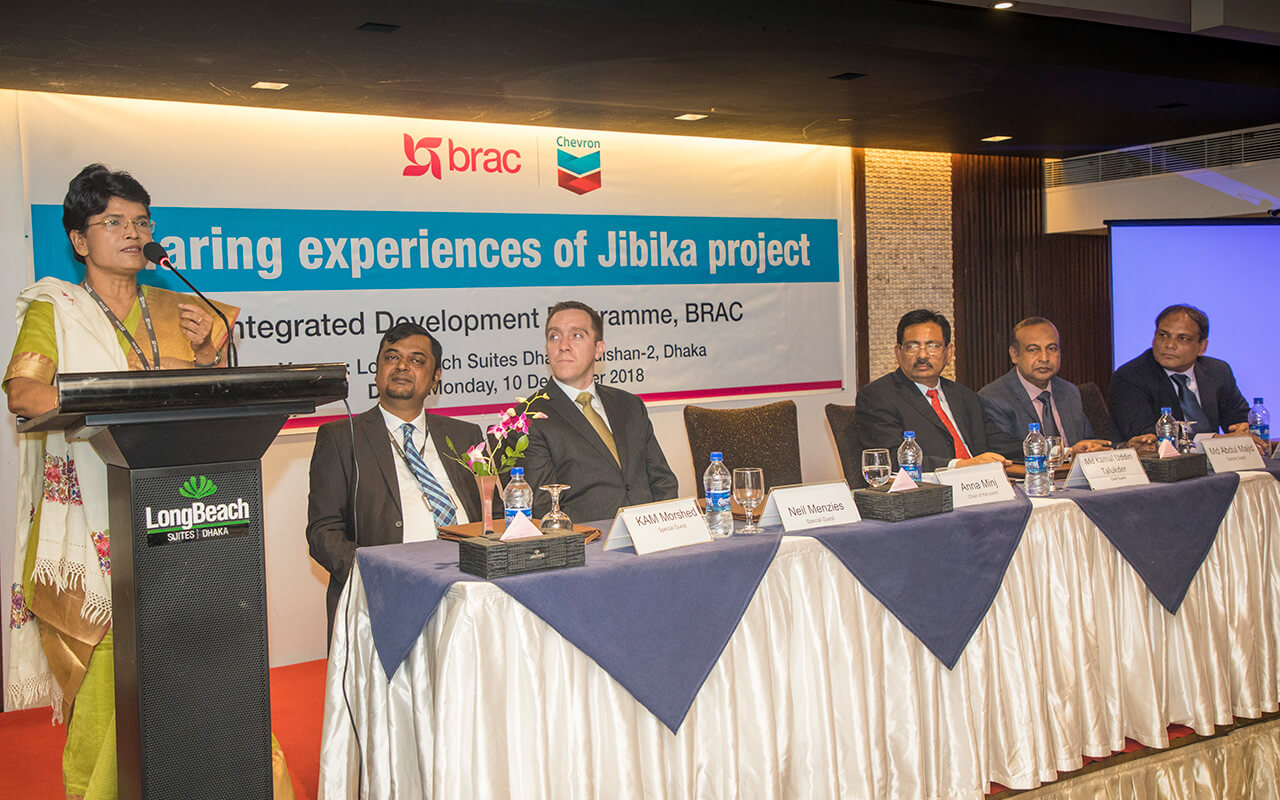
The Jibika project, a collaboration between BRAC and Chevron, implemented under BRAC’s integrated development programme, held an experience sharing event on Monday, 10 December 2018 at Dhaka to share the learnings and experiences of the three-year long project.
Md Kamal Uddin Talukder, Secretary of Rural Development and Cooperatives Division, Ministry of LGRD and Cooperatives, was present as the chief guest. Md Abdul Majid, Registrar and Director General, Department of Cooperatives, Ministry of LGRD and Cooperatives; Neil Menzies, President, Chevron Bangladesh; Ismail Chowdhury, Director, Policy, Government and Public Affairs, Chevron Bangladesh, and KAM Morshed, Director, Advocacy for Social Change, Technology and Partnership Strengthening Unit, BRAC attended as special guests. Anna Minj, Director, Community Empowerment, Integrated Development, Gender Justice and Diversity Programme of BRAC presided over the event.
Mr Talukder lauded the collaboration between BRAC, the largest development organisation in the world, and Chevron, Bangladesh’s largest international oil company, working together for the socio-economic development of vulnerable communities residing in Chevron’s areas of operation in northeast Bangladesh. President of Chevron, Neil Menzies thanked the Jibika project and the government cooperative department for their contribution in socio-economic development through the institutionalisation of community organisations.
KAM Morshed, Director, BRAC, emphasised on the value chain system and enterprise development of the community through the Jibika project, mentioning that this model can be replicated in other regions of the country, especially for the vulnerable people of the haor area.
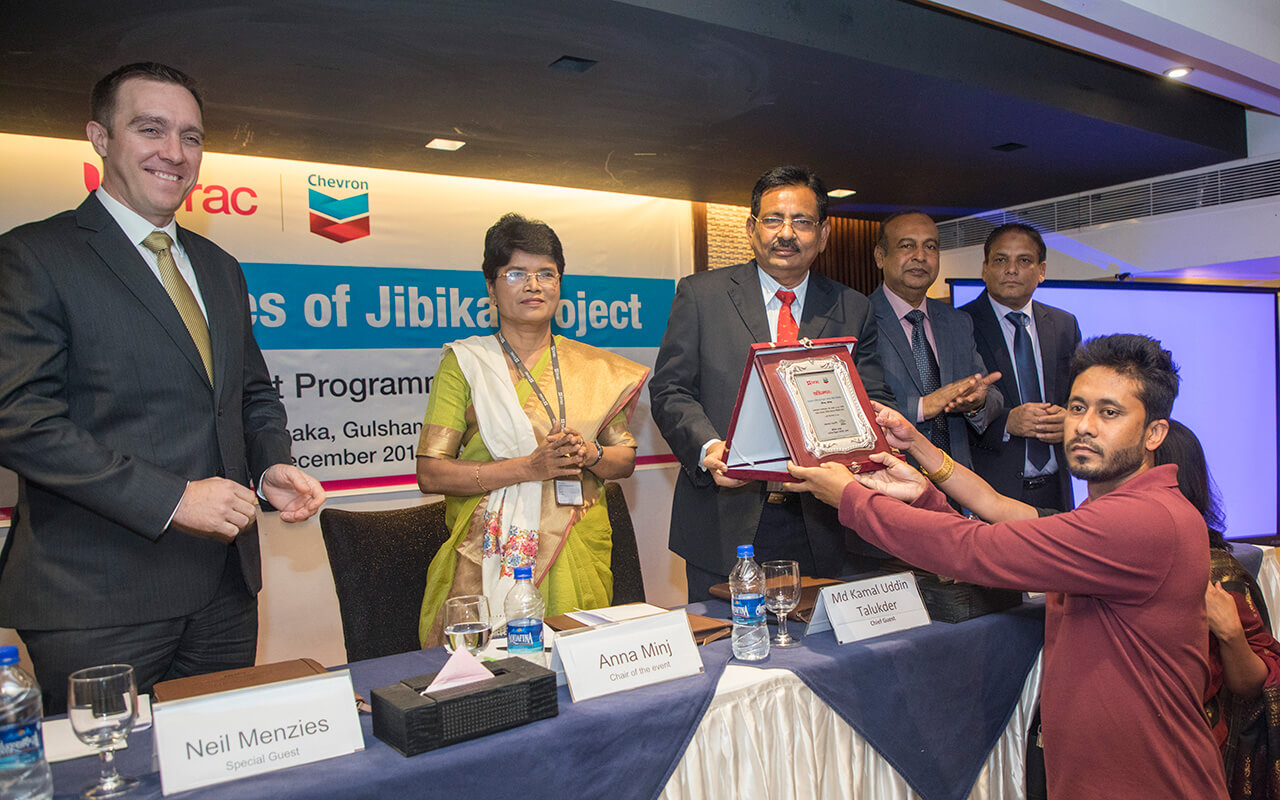
Jibika project participant Taslima Begum, President, Uttor Baluchar Zonaki Kornofuli Sharbik Gram Unnayan Shomobay Shamiti, said that the trainings and knowledge gathered from the BRAC-Chevron and IDEA’s Jibika project has helped her and other community to learn how to operate a village development organisation, how to improve enterprise through new technology, market system, and linkage with service providers. She thanked Jibika for improving her and other women’s lives of the community.
Besides sharing stories by the Jibika project participants, the Jibika model was displayed, along with a stall representing the Jibika VDO. A documentary showed two village developments, namely Amukona Village Development Organisation and Kashba Village Development Organisation from Nabiganj upazila of Habiganj district, for their recognition as best VDOs from the government cooperative for the year 2018.
The Jibika project was designed to develop local institutions and promote entrepreneurship for sustainable income growth of the marginalised farming households around the Chevron-operated gas fields in Sylhet, Moulavibazar, and Habiganj districts. Jibika’s economic development activities are steered through 112 community-based organisations known as village development organisations (VDO). IDEA, a Sylhet-based NGO has been working with BRAC as its implementing partner. About 20,000 people have benefitted since the implementation of Jibika three years ago.
The LEGO Foundation awards $100 million to Sesame Workshop to bring the power of learning through play to children affected by the Rohingya and Syrian refugee crises
New program will provide critical new insights into effective models of learning through play for children affected by crisis
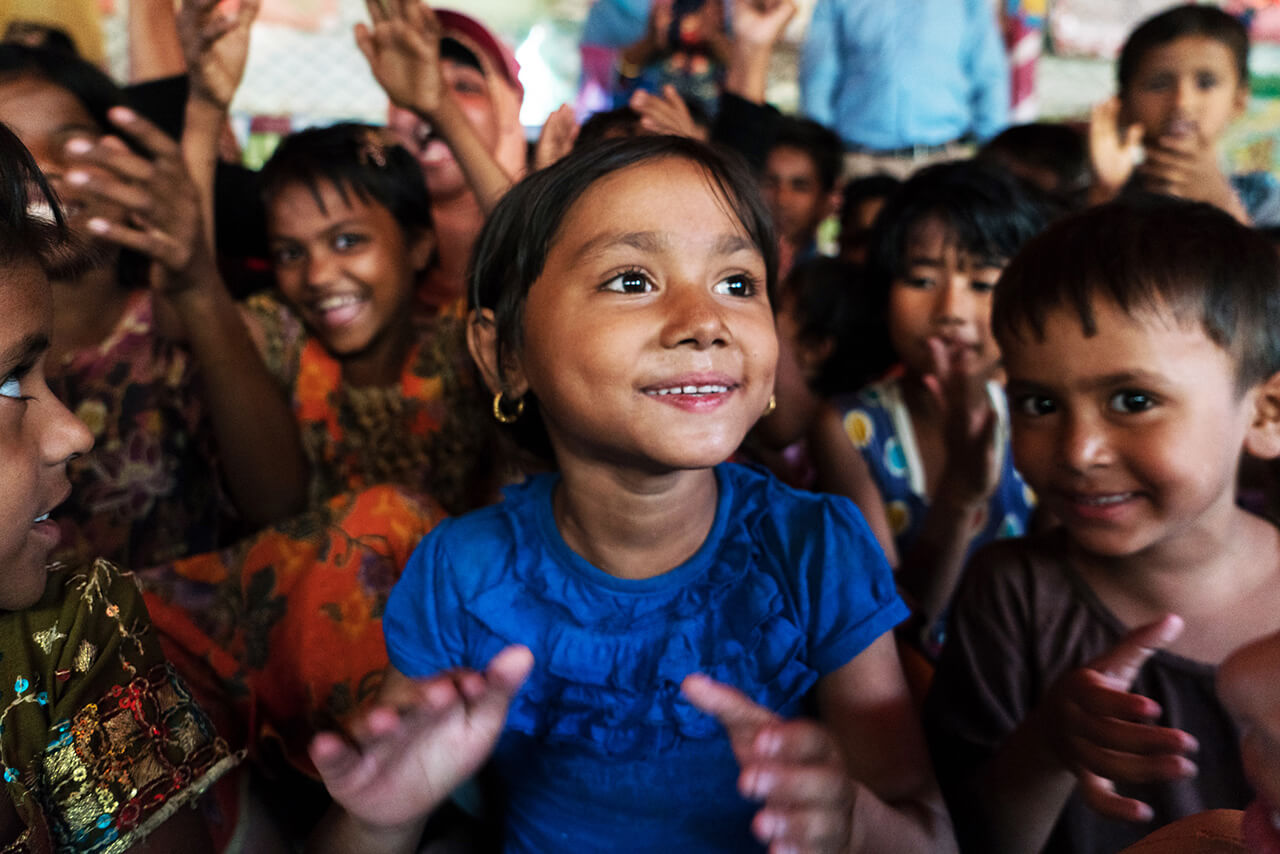
Billund, Denmark - 5 December 2018 - Today, the LEGO Foundation announced that it is awarding a $100 million grant to Sesame Workshop to ensure that young children affected by the Rohingya and Syrian crises have opportunities to learn through play and develop the skills needed for the future. Working in partnership with BRAC, the International Rescue Committee (IRC) and New York University’s Global TIES for Children, Sesame Workshop will reach children affected by crises in Bangladesh and the Syrian response region with early childhood and play-based learning opportunities.
The $100 million grant from the LEGO Foundation will benefit some of the world’s most vulnerable children and call attention to the critical importance of learning through play to set them on a path of healthy growth and development. The LEGO Foundation is the first to step up and meet the John D. and Catherine T. MacArthur Foundation’s call for the bold philanthropy needed to transform the way the humanitarian system serves children affected by crisis in early childhood.
The scale of the global refugee crisis is staggering—today, 68.5 million people are displaced worldwide. Among them are 25 million refugees, half of whom are children. As refugees experience displacement for an average of 10 years, millions of children are spending a significant part of their childhoods without access to adequate early childhood development opportunities. Adverse experiences like displacement can affect young children’s developing brains, with lasting effects on health and wellbeing. Engaging in play-based activities with responsive caregivers can help mitigate the detrimental, long term effects of displacement and trauma, ultimately giving children affected by conflict the skills they need to thrive into adulthood and rebuild their communities.
“This partnership marks the first step of the LEGO Foundation’s commitment to work within the humanitarian field to support children’s holistic development that incorporates learning through play. We hope to inspire other funders, humanitarian actors, world leaders and governments to act and urgently prioritise support for play-based early childhood development for children in humanitarian crises—a vastly overlooked but vital component in the progress of humanitarian aid. We hope that young children impacted by these crises will have opportunities to benefit from learning through play and also develop the skills needed for them to thrive in the future,” says Thomas Kirk Kristiansen, Chairman of the LEGO Foundation Board and 4th generation owner of the LEGO Group.
Less than 3% of the global humanitarian aid budget is currently dedicated to education with only a small fraction benefitting young children, despite clear evidence that early childhood interventions have immediate and long-term benefits for both children and their communities. The LEGO Foundation is committed to making a difference for children affected by conflict and displacement, to ensure a better tomorrow for all future generations.
“Research shows that not only is play vital for children’s psychological, emotional and cognitive health and development, but it also hones the resilience they need to overcome adversity and build their futures. Early adverse experiences negatively affect the development of brain architecture, which provides the foundation for all future learning, behavior and health. By providing play-based learning to children in crisis, we can help mitigate the detrimental, long term effects of displacement and trauma, ultimately giving a generation of refugee children a path forward,” says John Goodwin, CEO of the LEGO Foundation.
Sesame Workshop will use the $100 million grant to implement quality, play-based early childhood interventions, working in partnership with BRAC and IRC. This includes the following areas:
● Direct Services: Partnering with BRAC, the new program will scale up BRAC’s network of Humanitarian Play Labs to address the developmental needs of children ages 0 to 6 from Rohingya refugee and Bangladeshi host populations. BRAC’s Play Lab model is designed to give pre-school children age relevant and culturally appropriate play materials, a play-based curriculum, and safe spaces for guided play that ensures their holistic development.
New Sesame videos, storybooks, games, puzzles, and more featuring the beloved Muppets of Sesame Street will be created to foster engagement between children and their caregivers, nurture developmental needs, and build resilience for children ages 0 to 6.
The new program will also deepen the play-based learning aspects of the existing Sesame Workshop-IRC program that serves children and families affected by the Syrian conflict, including support for caregivers to better engage in playful learning with their children.
● Mass Media: Harnessing the power of the Sesame Street Muppets, Sesame Workshop will create videos focused on play to be shared through family-friendly mobile and pop-up viewings in refugee and host communities. Global Sesame content will also be used—including video content from Sisimpur, the Bangladeshi version of Sesame Street, and from a new TV series in production in the Syrian response region—to meet the unique needs of refugee and host community children.
Much of the new content will use animated and nonverbal formats, so that it can be used to address the needs of displaced children no matter where they live or what language they speak.
“Women and children bear the brunt of any humanitarian crisis, and many are traumatised by the brutal violence they have experienced. However, children are also amazingly resilient and take up every opportunity to play, learn and just be children. Children use play as a shield, even if it is for a few hours, to overcome the trauma they’ve endured, create happy memories and make new friends,” said Erum Mariam, Director, BRAC Institute of Educational Development. “With support from the LEGO Foundation and in partnership with Sesame Workshop, we will scale up our Humanitarian Play Lab model to give children from both refugee and host communities the opportunities to play and learn that are critical to their healthy development.”
“With the LEGO Foundation’s extraordinary award, Sesame Workshop and our partners have an unprecedented opportunity to reach and teach some of the world’s most vulnerable children by harnessing the power of learning through play,” said Jeffrey D. Dunn, President & CEO of Sesame Workshop. “The global refugee crisis is the humanitarian issue of our time, and we are deeply humbled by the trust the LEGO Foundation has placed in us to uplift the lives of children affected by conflict. Together with our partners at BRAC, the IRC, and NYU, we can forge a legacy for children worldwide affected by displacement, today and for generations to come.”
NYU’s Global TIES for Children has been selected as the independent evaluation partner for the program and will implement an evidence-based research and evaluation program, which will deepen understanding around play-based early childhood interventions in humanitarian contexts.
Sesame Workshop will receive the $100 million grant over a 5-year period, with funds released as established milestones are met.
###
About the LEGO Foundation
The LEGO Foundation aims to inspire and develop the builders of tomorrow; a mission that it shares with the LEGO Group. The LEGO Foundation is dedicated to building a future where learning through play empowers children to become creative, engaged, lifelong learners. Its work is about re-defining play and re-imagining learning. In collaboration with thought leaders, influencers, educators and parents the LEGO Foundation aims to equip, inspire and activate champions for play. Learn more on www.LEGOfoundation.com.
About Sesame Workshop
Sesame Workshop is the nonprofit media and educational organization behind Sesame Street, the pioneering television show that has been reaching and teaching children since 1969. Today, Sesame Workshop is an innovative force for change, with a mission to help kids everywhere grow smarter, stronger, and kinder. We’re present in more than 150 countries, serving vulnerable children through a wide range of media, formal education, and philanthropically-funded social impact programs, each grounded in rigorous research and tailored to the needs and cultures of the communities we serve. For more information, please visit sesameworkshop.org.
About BRAC
BRAC is a global leader in developing cost-effective, evidence-based programmes, and has been ranked the #1 NGO in the world for the last three years consecutively by NGO Advisor. BRAC’s vision is a world free from all forms of exploitation and discrimination where everyone has the opportunity to realise their potential. Founded in Bangladesh in 1972, BRAC acts as a catalyst, creating opportunities for people to transform their lives. BRAC uses an integrated model to change systems of inequity, through social development programmes, humanitarian response, social enterprises, socially responsible investments and a university. The organisation has an annual expenditure of more than USD 1.1 billion, with the majority self-financed from its enterprises, and operates in conflict-prone and post-disaster settings in 11 countries across Asia and Africa.
About IRC
The International Rescue Committee responds to the world’s worst humanitarian crises, helping to restore health, safety, education, economic wellbeing, and power to people devastated by conflict and disaster. Founded in 1933 at the call of Albert Einstein, the IRC is at work in over 40 countries and 28 offices across the U.S. helping people to survive, reclaim control of their future, and strengthen their communities. Learn more at www.rescue.org and follow the IRC on Twitter & Facebook.
About NYU Global TIES
Founded in 2014, New York University's Global TIES for Children is an international research center dedicated to designing, evaluating and advising on programs and policies that improve the lives of children and youth in the most vulnerable regions across the globe. Embedded within NYU’s Institute of Human Development and Social Change, and supported by NYU Abu Dhabi and the NYU Abu Dhabi Research Institute, Global TIES for Children works with some of the world’s leading non-governmental organizations and governments in low-income and conflict-affected countries to develop and evaluate innovative approaches to promoting the holistic development of children and their communities. Learn more at https://steinhardt.nyu.edu/ihdsc/global-ties.
BRAC and NHRC sign MoU to increase facility for persons with disabilities in metro rail
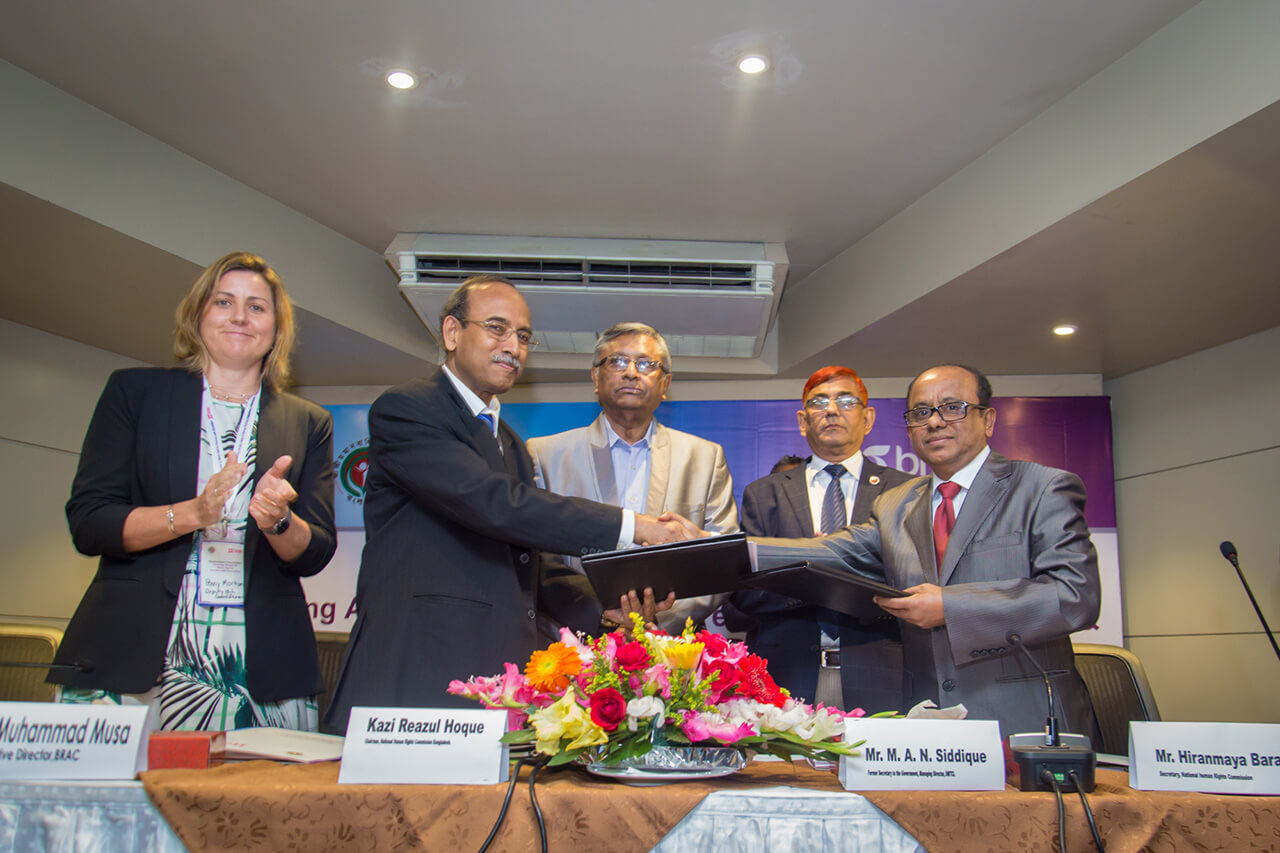
National Human Rights Commission (NHRC) chairman Kazi Reazul Hoque said the government is seriously considering the importance increasing facilities in different areas for the persons with disabilities. But the real challenge lies in the implementation. It is true to all the underprivileged communities of the country as mainstream development opportunities still largely eschew them. Their merit and potential must be put to full use for national development. Enhanced ability for safe mobility is crucial for the development of every disabled person, which is why the metro-rail system that will be introduced in the capital in the coming years must integrate features facilitating safe commuting by people with disabilities.
The NHRC chairman made these observations in his speech today on Sunday (2 December 2018) at a stakeholder consultation event organised at the BRAC Centre in the capital. He was present at the programme as the chief guest. BRAC and NHRC organised it on the occasion of National Disability Day observed on 3 December.
A memorandum of understanding was signed at the event between the two organisations with the objective of increasing facilities for the disabled people in metro rail. Hiranmaya Barai, secretary, NHRC, and Dr Muhammad Musa, executive director, BRAC, signed the MoU on behalf of the respective parties.
Under this MoU the two organisations will jointly work with the aim to ensure increased access of the disabled people to the metro rail and other public infrastructures, while also work for digitalisation to the benefit of cross sections of people.
NGO Affairs Bureau director general KM Abdus Salam, attended the event as the special guest. NHRC secretary Hiranmaya Barai, Australian deputy high commissioner Penny Morton, BRAC executive director Dr Muhammad Musa, Dhaka Mass Transit Company Limited managing director MAN Siddique, Women with Disabilities Development Foundation (WDDF) founder Ashrafun Nahar Misti, BRAC Advocacy for Social Change director KAM Morshed spoke among others at the programme.
Dr Muhammad Musa said that this MoU is not merely an agreement, but a pledge also. He stressed that BRAC is and will always stand by the disabled people.
He further said, It’s true that we are now progressing with a growth rate of over 7 per cent. The nation is advancing through the realisation of the dream we had dreamt as we fought for our national liberation. In spite of this remarkable progress our economy has a setback. It is because not every citizen is benefiting from this fruit of development. Having kept this reality in mind, we have signed this agreement so that we can work together to ensure that they have better access to facilities.
Urban Innovation Challenge: Five teams awarded
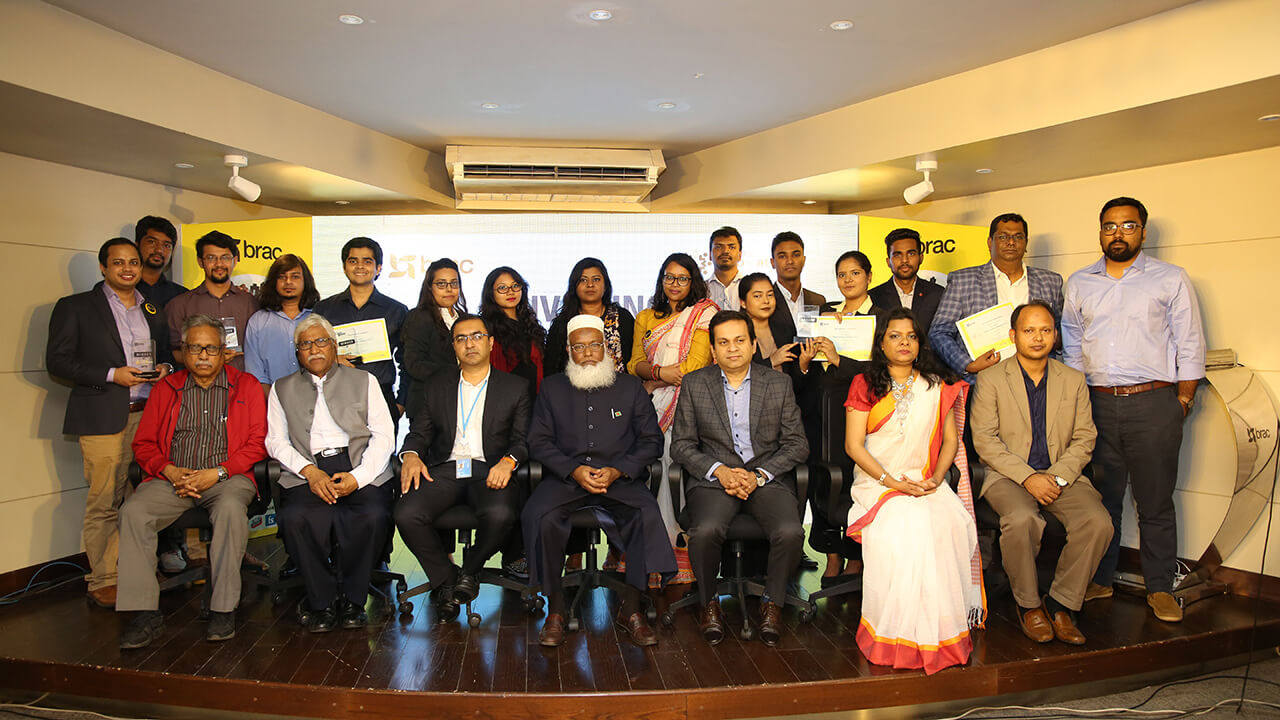
Five teams won awards in four categories for innovating effective solutions for a number of urban problems such as healthcare, housing and renewable energy at the grand finale of Urban Innovation Challenge.
Winners are Nirvana and City Bird in renewable energy category, Jotno Healthcare in healthcare category, Onushongo in low-cost housing and Drinkwell in water sanitation and hygiene categories. Responsive Urbanist received honourable mention from WASH category.
BRAC launched the Urban Innovation Challenge consecutively for the second time this year, which was themed on 'Our cities. Our solutions.' The grand finale of the competition was organised at the BRAC Centre today on Tuesday (27 November 2018). Additional secretary of the environment and climate ministry Dr Atiqur Rahman was present as the chief guest at the event.
Also present at the event were eminent environment scientist Dr Ainun Nishat, BRAC's senior director for strategy communications and empowerment and jury board member of the competition Asif Saleh, advisor to the Startup Project of the information and communication technology ministry Tina Zabeen, coordinator for the youth programme of Prothom Alo Munir Hasan, director of EMK Center in Dhaka Naveed Akbar, chief executive of Green Delta Life Insurance Farzana Chowdhury, programme head of BRAC Urban Development Programme Hasina Mushrofa and representatives from a number of non-governmental organisations.
With the objective of engaging the young people to find innovative, low-cost and effective solutions for urban problems BRAC organises this competition. This year the competition began on 24 July to receive 300 ideas at the first stage. A total of 13 ideas were selected to compete at the final stage. Although ideas were invited in five categories namely, housing, healthcare, WASH, renewable energy and climate change, no submission was made for climate change.
The winning teams will receive grants of up to Tk 5 lakh each. In addition, BRAC will assist them to work on their innovations and make it ready for practical implementation.
Dr Atiqur Rahman appreciated BRAC for its initiative to engage young people in innovative work, saying that such competitions, while bring youths opportunities to sharpen their ideas and develop their merit, help find practical solutions to many social issues.
Dr Ainun Nishat observed that there is no alternative to find innovations to ensure social progress. He also urged to find ways to effectively market rural products in the urban consumers.
Asif Saleh said BRAC puts high importance on building fruitful partnership for successful implementation of SDG. He also said, understanding a problem inside out is the most important part of any innovation exercise. For that it requires a team to be adequately dynamic and develop an efficient business plan as well, he added.
To know more about the BRAC Urban Innovation Challenge, visit http://uic.brac.net/
BRAC observes Financial Inclusion Week
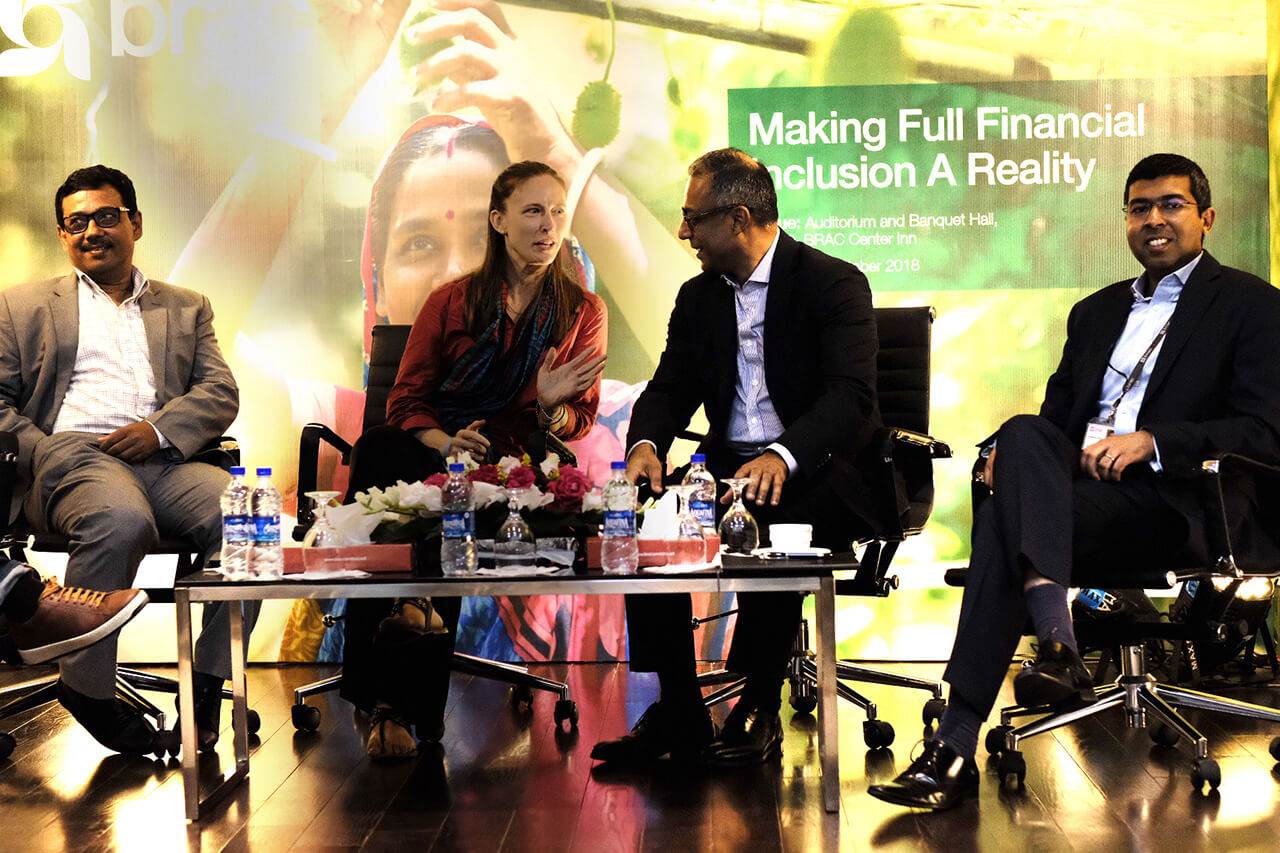
Bangladesh should strengthen its effort to build an inclusive financial system to provide safe, quality and appropriate financial services to all people, those living in poverty and remote areas in particular. This comprehensive system should be able to ensure access of financially capable clients to a range of quality financial services at affordable prices, with convenience, dignity, and consumer protections, delivered by a range of providers in a stable, competitive market.
Speakers expressed these views at a discussion session today on Wednesday (31 October 2018), organised at the BRAC Centre in the capital. BRAC arranged the event to observe Financial Inclusion Week, introduced and coordinated by the Center for Financial Inclusion at Accion (CFI), a Washington DC based non-profit think tank.
Themed on 'getting inclusion right' the timeline for Financial Inclusion Week 2018 is from October 29 to November 2.
Shameran Abed, director, BRAC Microfinance, Maria A May, programme officer, Bill and Melinda Gates Foundation, Ashraful Islam, country project coordinator, SHIFT SAARC, Bangladesh at United Nations Capital Development Fund, and Feisal Hussain, team leader, Business Finance for the Poor in Bangladesh, Nathan Associates, spoke at the discussion. Rakib Ovi, programme manager, Social Innovation Lab, BRAC, moderated the session.
The speakers mentioned that at present in Bangladesh 50 per cent of the population aged 15 years or more do not have any individual or group account in any bank or financial institutions. For women of this age group the percentage is as high as 64 per cent. They said to build an appropriately inclusive financial system we have to first identify the factors preventing a very large number of people from accessing institutional financial services.
"Having full inclusion means creating access to finance that people actually need and the goal should be to give everyone access through a financial institution. But the reality is, traditional banks are not interested about financial inclusion," said Shameran Abed.
Women are not fully in charge of financial management in the household and so huge gender gaps exist in financial inclusion in Bangladesh, said Maria A May, stressing adequate initiatives should be undertaken to address the issue.
The draft of the national financial inclusion strategy is almost ready, Feisal Hussain informed the audience, saying that financial service providers and digital ecosystems are two key themes of the strategy.
BRAC wins AGFUND International Prize for inclusive and quality education model
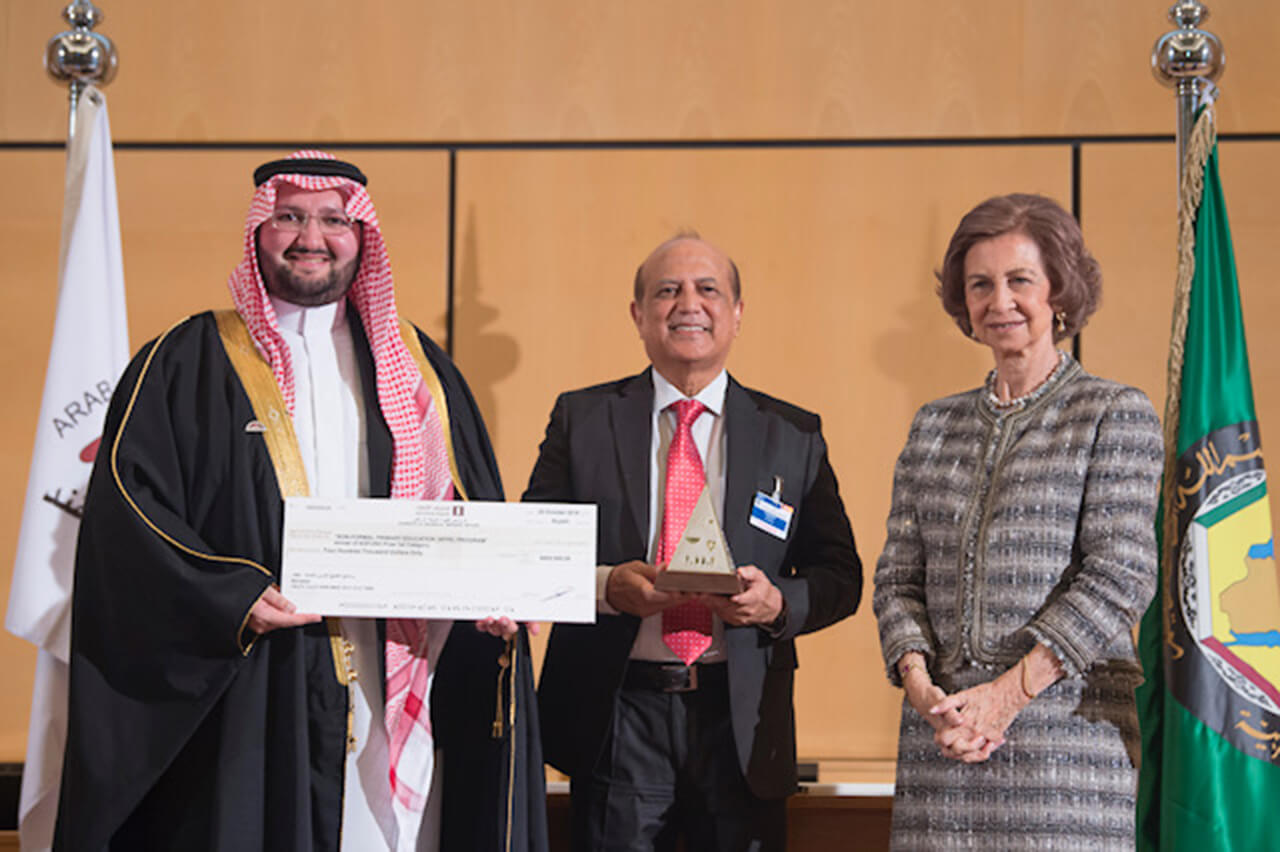
BRAC has won the 'AGFUND International Prize for Pioneering Human Development Projects' for 2017 for its non-formal primary education model especially designed for children who have dropped out of or never gone to school.
BRAC vice-chairperson Dr Ahmed Mushtaque Raza Chowdhury received the award from Prince Abdulaziz bin Talal bin Abdulaziz Al Saud, special representative of AGFund, at a ceremony at the United Nations Office in Geneva, Switzerland on Wednesday (17 October 2018). Queen Sofia of Spain, member of AGFUND prize committee, was also present at the event.
AGFUND International Prize is awarded by the Arab Gulf Program for Development (AGFUND), founded in 1980 by Prince Talal Bin Abdul Aziz Al Saud with support from Gulf Cooperation Council Countries. Working with a strategic focus on the Sustainable Development Goals (SDGs), the organisation introduced the AGFUND International Prize in 1999.
The prize committee selected two orgaisations and one individual as winners for the 2017 award themed on “Ensure inclusive and quality education for all and promote lifelong learning". A total of 76 projects competed for the prize.
BRAC has won the First Category Prize, awarded for projects implemented by UN, international or regional organisations, for its non-formal primary education model. The award comes with prize money worth US$ 400,000.
Nepalese organisation Jeevan Bikas Samaj has won the Second Category Prize for its 'Accelerating sustainable solution for quality education' project, which comes with US$ 300,000 prize money. This category is reserved for national level non-governmental organisations.
Sunitha Krishnan, an Indian anti-trafficking champion and co-founder of Hyderabad-based Prajwala, won the Fourth Category Prize, reserved for projects implemented by individuals. The money worth of the prize is US$ 100,000.
The Third Category Prize allocated for projects by government agencies has been withheld for failure to meet the award criteria, according to the AGFUND website.
Theme of AGFUND Prize 2018 is 'Eradication of Poverty', goal 1 of SDGs 2030.
WASH activities tackle challenge in coastal belt and haors Integrated planning urged to meet SDGs
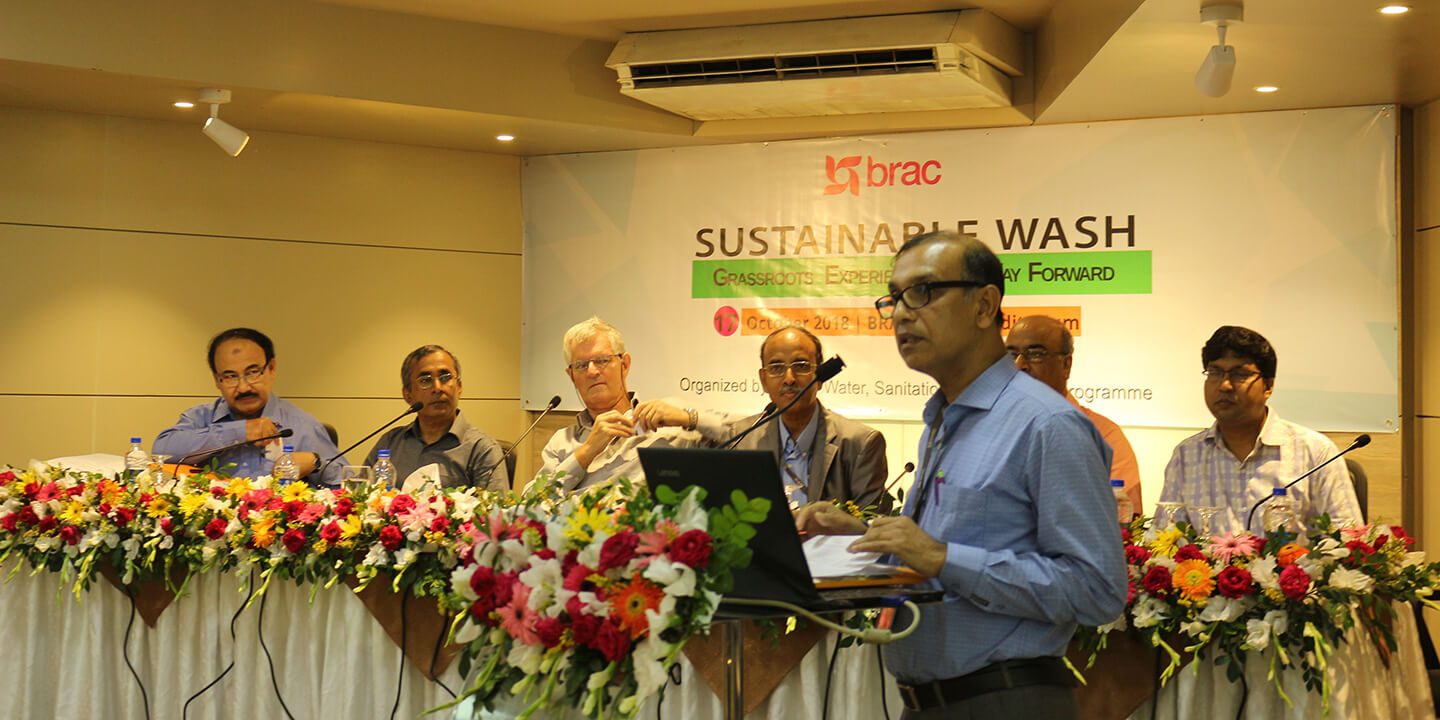
Climate change is increasingly making it difficult to implement sustainable water sanitation and hygiene programmes in the coastal and haor regions. Increasing water salinity along the coast, increase in arsenic level, rising bacterial contamination and lack of land suitable for digging pits to install sanitary latrines are the main problems in this regard. The added problems in the hilly terrains and hard-to-reach localities are intense water shortage and unavailability of cost-effective and sustainable WASH technologies. Effective solutions to these problems must be put in place through strengthening mass awareness and integrated initiatives to reach the SDG-6 of ensuring universal access to safe water, improved sanitation and hygiene practices.
Speakers revealed this alarming scenario at a workshop titled "Sustainable WASH: Grassroots experience and way forward" organised today on Wednesday (17 October 2018) at BRAC Centre in the capital. BRAC organised this event to forward recommendations to strengthen the WASH programmes focusing on these regions.
Peter De Vries, first secretary to the Dutch Embassy, Dr Khairul Islam, country representative of Water Aid, SMA Rashid, Executive Director, NGO Forum for Public Health, Md Shofiqul Alam, specialist of WASH at the UNICEF, Bangladesh, Mohammad Golam Muktadir, executive engineer of Department Public Health Engineering, and Dr Md Akramul Islam, director of BRAC's Communicable Disease and WASH Programme, were present at the workshop as guests of honour and panel speakers.
Dr Muhammad Musa, executive director of BRAC, gave the welcome speech at the programme. Dr Muktadir Kabir, programme head of BRAC's WASH and malaria programmes, gave the keynote presentation.
Adequate number of cleaning staff is essential for the places and establishments where there are public gatherings to keep environment hygienic, Dr Khairul Islam observed, saying that, "But cleaning staff in Bangladesh has a high rate of dropping out. We have to give more effort and increase spending to retain cleaning staff."
Peter De Vries said, "We understand that this sector is in need of an investment boost. My government's investments will continue in this sector. But we are more interested in investing in innovative solutions, capacity building and effective management."
Dr Muhammad Musa in his speech thanked the Dutch government for its financial support to BRAC's WASH programme. Stressing priorities for Bangladesh to achieve SDG-6, he said, "Introducing sustainably effective solutions to the WASH sector in the hilly and remote areas is a high priority. Strengthening collaborations between the government and NGOs, reinforcing WASH activities at both primary and secondary schools and stepping up advocacy campaign both at the grassroots and policymakers must also be in the high priority list."
The speakers put forth a number of recommendations which include: Strengthening collaboration among stakeholders to speed up the tackling of SDG-6 challenges, involving local civil society to strengthen public awareness campaigns, creation and promotion of more private entrepreneurs to boost sanitation facilities, increasing national budget allocation to improve hygiene and faecal sludge management, intensifying WASH activities in schools and healthcare facilities across the country.
BRAC began its water, sanitation and hygiene programme in 2006. At present this programme has expanded to 289 upazilas in 54 districts. So far, under this programme BRAC has provided access to safe drinking water for 20 lakh and 46 thousand (2.46 million) people and sanitary latrines for 4 crore 27 lakh and 60 thousand (42.76m) people. Besides it, BRAC has also installed 1,619 tube-wells till September this year in Cox's Bazar for the forcibly displaced Rohingyas of Myanmar.
Innovative Justice Challenge in Dhaka
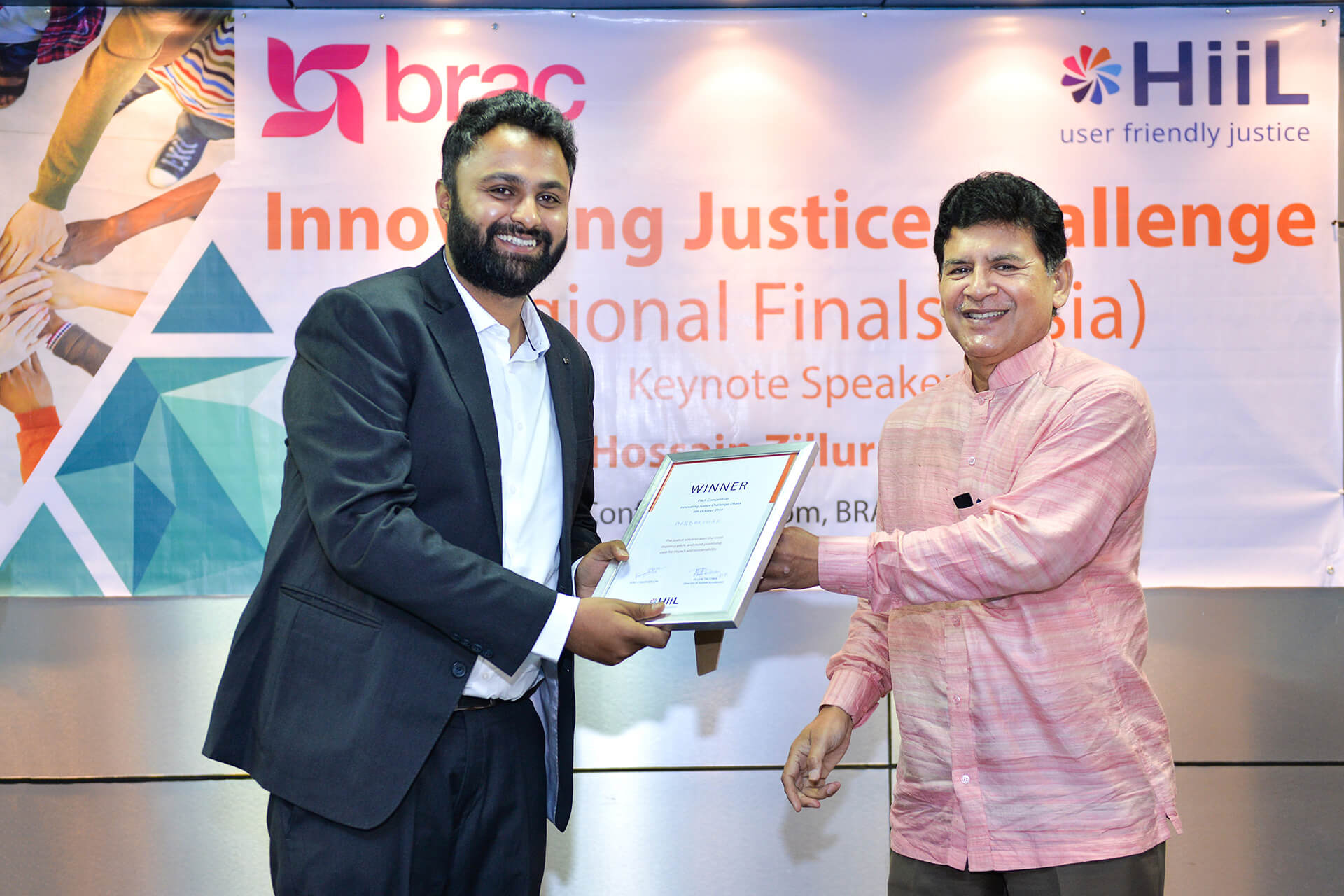
Aniket Doegar, a young innovator from India, through innovative use of technology has designed a new way to reach important messages to the poor and ultra poor communities. The common theme of the messages is that the measures the government has taken to ensure justice for them. Gautami Raiker, also an Indian, has a different initiative which helps startup businesses in legal matters. Lipi Rahman from Bangladesh has come up with her technological initiative to provide assistance to her clients in land matters. The idea of Cho Chan Myei, a Myanmar citizen, builds on the theme of ensuring women’s safety through using technology.
These innovative ideas were showcased at the Asia region grand finale of ‘Innovative justice challenge’ organised today on Saturday (6 October 2018) in the Dhaka city. The objective of the competition was to facilitate innovations that would help distressed people access justice easily and effectively. BRAC’s Human Rights and Legal Assistance (HRLS) programme and Netherland-based HiiL organised the Asia region’s final round of the competition at the BRAC Centre.
Aniket Doegar, selected winner by the jury panel, will be awarded the honour of ‘Justice Accelerator’ by HiiL and receive a grant of € 20 thousand in four instalments in one year. HiiL will also provide him with entrepreneurship training.
Former adviser to the Caretaker Government and founder of Power and Participation Centre Dr Hossain Zillur Rahman attended the event as the key speaker. Also present were HiiL representative Martain Kind and Nathalie Dijkman and HRLS associate director Sajeda Farisa Kabir.
Jury members lawyer Kanan Amal Dhru, lawyer Junaid Ahmed Chowdhury and BRAC Dairy and Food Project director Md Anisur Rahman were also present at the event.
Dr Hossain Zillur Rahman said, “Innovations are urgently needed to take justice at the doorstep of the ultra poor people. While it is natural that some innovations will win since it is a competition, but that does not at all mean that other innovations are failures. All the innovations are important to promote welfare of the society. So it is very important that everybody will proceed further with their own ideas and initiatives.”
The organisers said every year around one billion people around the world fall victim to injustice. Of these acts 82 per cent are left with no remedy. Around 30 per cent of the victims consider themselves too weak to seek the course of justice. Organisations and activists who work worldwide to promote justice call for an urgent improvement of the process of accessing justice. They also feel that this will need innovative solutions that will be both easily accessible and cost-effective.
HiiL, since 2005, is dedicatedly working to promote innovations to improve access to justice worldwide. Innovative Justice Challenge is one of their initiatives to this end. This year 430 ideas were submitted in the competition.
BRAC opens first two-storey learning centre for Rohingya children in Kutupalong
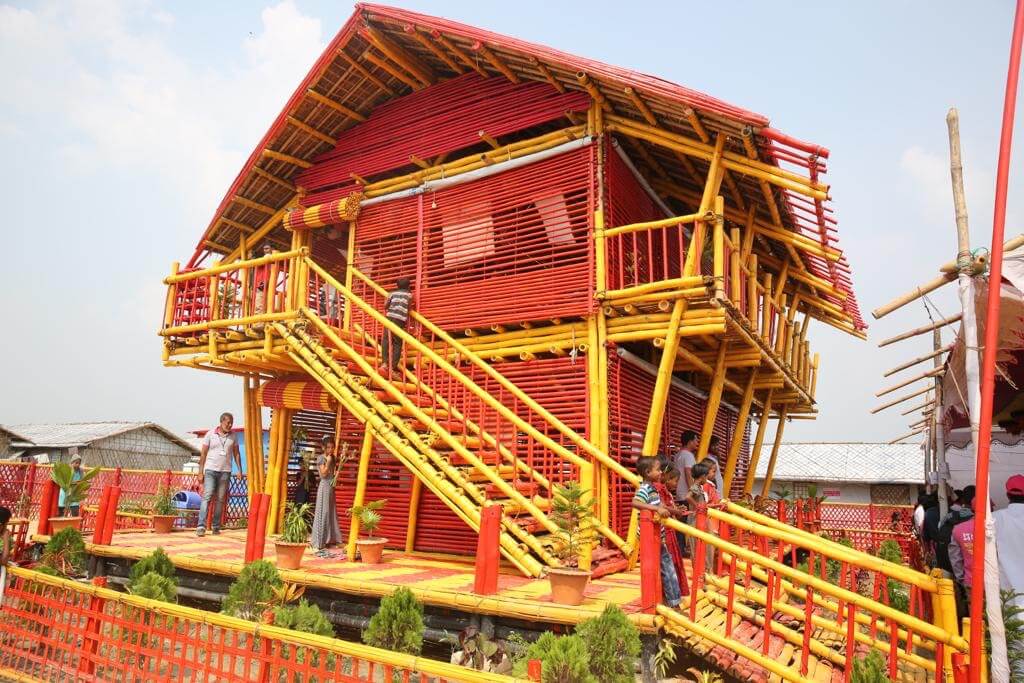
The two-storey structure, made mainly of bamboo and other natural ingredients, stands two feet above ground, which means rainwater won’t stand. The architecture follows indigenous Rohingya building traditions, allowing better resilience to extreme weather, ventilation and best utilisation of space. From yesterday (Wednesday) 240 Rohingya children are taking lessons in this centre.
This first two-storey temporary learning centre (TLC) for the Rohingya children has been on a pilot basis in the extension area of Camp-4 in Kutupalong of Ukhiya in Cox's Bazar. BRAC and the United Nations refugee agency (UNHCR) have jointly built the structure with support from the Refugee, Relief and Repatriation Commission of Bangladesh government. The learning centre was inaugurated by the refugee, relief and repatriation commissioner (RRRC), Mohammad Abul Kalam, ndc, on Wednesday (3 October 2018).
The learning centre was designed by the architecture department of BRAC University. Standing 38.6 feet high and 25 feet wide, each floor accommodates up to 40 students in one shift. Like all other TLCs of BRAC, this centre will also run on three shifts, six days a week. The entire structure is temporary, so it could be relocated anytime.
RRRC Mohammad Abul Kalam, ndc, said: “The Rohingya children will be taught English and mathematics besides Burmese language.” Nesar Ahmed, joint secretary to the Ministry of Primary and Mass Education of Bangladesh, praised the initiative and also BRAC’s role as partner to the government. Describing it as a cooperative and fruitful initiative, acting head of operations at UNHCR’s Cox’s Bazar sub-office, Bernadette Castel-Hollingsworth, said they were looking forward to doing more such work in future. UNICEF’s head of education, Pawan Kuchias wished best of luck to the initiative.
D. Safiqul Islam, director of BRAC Education Program, said every child is a goldmine of dreams and possibilities and education plays an important role in realising those. BRAC has taken this initiative in order to accommodate maximum number of children in limited space.
The ground floor is for pre-primary level, and the first floor for primary. BRAC’s target for 2019 is to enroll 100,000 Rohingya children in its learning centres. Currently, more than 500,000 children are living in the Rohingya camps, of which only 31% are attending the learning centres operated by BRAC and others.
BRAC is running 317 temporary learning centres in the camps, with more than 31,000 children enrolled. These learning centres focus on early-grade learning, basic literacy, numeracy, life-saving information, psycho-social support and life skills.
Join the world’s biggest family

